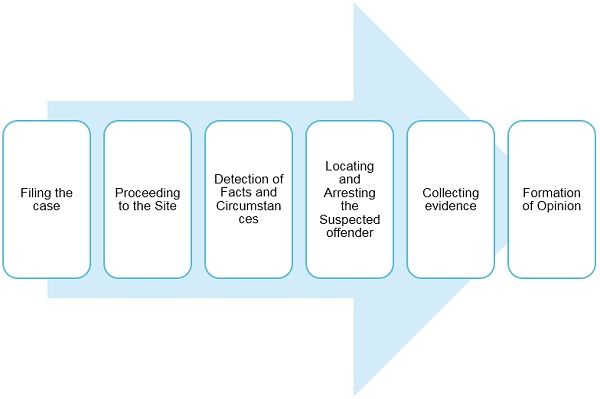
The Role of Witnesses in the Claims Investigation Process.
Witnesses play a crucial role in the investigation of claims. In any legal or insurance dispute, witnesses provide essential testimony and evidence to help determine the truth of a situation and establish liability. Their accounts can often be the deciding factor in resolving complex cases, shedding light on events that may otherwise be buried in speculation or conflicting accounts.
Investigations are typically conducted to gather relevant facts and evidence to support or refute a claim. Witness statements serve as crucial pieces of evidence, helping investigators uncover the truth and determine the credibility and accuracy of a claim. Witnesses can offer firsthand accounts, provide additional information, or corroborate existing evidence, which is invaluable in establishing the validity of a claim and ensuring a fair resolution.
The claims investigation process heavily relies on the cooperation and honesty of witnesses. By providing accurate, truthful, and detailed accounts, witnesses contribute to a fair investigation and help ensure that justice is served. Their testimonies can influence the outcome of a case, either supporting or contesting the claims being made, and ultimately determine whether a claimant is compensated for their losses or not.
In conclusion, witnesses play a crucial role in the claims investigation process. Their testimonies and accounts are vital for establishing the truth, determining liability, and ensuring a fair resolution. Investigators rely on witnesses to provide accurate and detailed information, which can significantly impact the outcome of a case. Without witnesses, claims investigations would lack vital evidence and may result in unfair or inaccurate conclusions.
Understanding the Role of Witnesses in Claims Investigation
During the claims investigation process, witnesses play a crucial role in providing valuable information and supporting evidence. Their unbiased accounts of the events can help verify the accuracy of the claim and determine liability.
Witnesses are individuals who have observed or have knowledge about the incident that led to the claim. These individuals can be anyone present at the time of the event, including bystanders, employees, or even experts in relevant fields.
When conducting an investigation, claims adjusters or investigators may seek to interview witnesses to gather more information about the incident. They may ask them to provide a detailed account of what they saw or heard, which can help in corroborating or contradicting the claimant’s version of events.
Witnesses can provide essential details such as the sequence of events, the conditions at the scene, or any potential contributing factors. This information can be crucial in determining the cause of the incident and identifying any responsible parties.
Furthermore, witnesses can also provide information about the claimant’s behavior and credibility. Their statements can help assess the claimant’s truthfulness and determine if there are any inconsistencies in their account.
In some cases, witnesses may also provide photographic or video evidence that can strengthen the investigation. This evidence can help recreate the scene or provide visual confirmation of the damages or injuries claimed.
It is important to note that witnesses should be unbiased and provide an honest account of the events. If a witness has a conflict of interest or is connected to any of the involved parties, their testimony may be questioned or considered less reliable.
In conclusion, witnesses play a crucial role in the claims investigation process. Their unbiased and firsthand accounts, along with any supporting evidence, can help determine the validity of a claim and ensure a fair resolution of the case.
| – Witnesses provide valuable information in the claims investigation process |
| – Their accounts help verify the accuracy of the claim and determine liability |
| – Witnesses can provide essential details and supporting evidence |
| – Their credibility and potential conflicts of interest should be assessed |
Gathering Crucial Information from Eyewitnesses
When it comes to claims investigation, witnesses play a crucial role in providing valuable information. Eyewitnesses are individuals who have seen or experienced an event firsthand and can provide their account of what happened. Their testimony can greatly impact the outcome of a claims investigation, as it can provide crucial details and perspectives that may not be captured by other forms of evidence.
One of the main reasons why witnesses are important in the claims investigation process is that they can provide an unbiased account of the event. Their perspective is not influenced by any personal interests or motivations, making their testimony more reliable. Gathering statements from multiple witnesses can also help corroborate or challenge other pieces of evidence, helping investigators get a more accurate picture of what occurred.
Another key role that eyewitnesses play is in filling in the gaps in information. Often, claims investigations rely on physical evidence, such as photographs, videos, or documents. However, these pieces of evidence may not always paint a complete picture of the event. Eyewitnesses can provide additional details about the incident, including things like the sequence of events, the actions of those involved, and any other relevant factors that may not be captured by physical evidence alone.
Furthermore, eyewitnesses can also provide vital information about the credibility of the parties involved in a claim. They can provide insights into the behavior, character, and actions of the individuals involved, helping investigators assess their honesty and credibility. This information can be crucial in determining the validity of a claim and making informed decisions on how to proceed with the investigation.
In conclusion, witnesses play a crucial role in the claims investigation process. Their testimony can provide valuable and unbiased information, fill in gaps in evidence, and help assess the credibility of the parties involved. Investigators should prioritize gathering statements from eyewitnesses to ensure a thorough and accurate investigation.
Eyewitness Testimony and Its Impact on Claim Evaluation
Eyewitness testimony plays a crucial role in the claims investigation process. When evaluating a claim, insurance companies heavily rely on witness statements to gather information and determine the validity and accuracy of the claim.
Witnesses are individuals who have observed an incident or event relevant to a claim. They provide their testimony, recounting what they saw or experienced, which can provide valuable insight into the circumstances surrounding a claim. Their statements can help establish the facts and assist insurance adjusters in making objective decisions.
One of the key benefits of eyewitness testimony is its ability to provide a firsthand account of an incident. This can help corroborate or challenge the information provided by the claimant, allowing the insurance company to better understand the sequence of events and determine liability.
However, it is important to recognize that eyewitness testimony is not infallible. Memories can be influenced by various factors, such as stress, time, and external influences. This can lead to inaccuracies or inconsistencies in witness statements, which can complicate the claims evaluation process.
To mitigate these potential issues, insurance companies often employ trained professionals to conduct thorough interviews with witnesses. These professionals are skilled in asking relevant questions, gathering detailed information, and assessing the credibility of witness statements.
Additionally, insurance adjusters may seek multiple witness accounts to compare and cross-reference information. This helps identify any discrepancies and inconsistencies and ensures a more accurate and comprehensive understanding of the incident.
In conclusion, eyewitness testimony plays a significant role in the claims investigation process. It provides valuable information that helps insurance companies evaluate claims more effectively. While the reliability of eyewitness testimony can be influenced by various factors, careful consideration, and detailed analysis of witness statements can lead to a more accurate assessment of the claim.
Establishing Credibility through Witness Statements
During the investigation process, witnesses play a vital role in providing valuable information and establishing credibility. Witness statements can help verify the accuracy of the claims being made and provide additional evidence to support or refute the allegations.
When obtaining witness statements, it is important to ensure that the witnesses understand the significance of their role and the impact their statement can have on the outcome of the investigation. Clear instructions should be given to witnesses on what should be included in their statements, such as a detailed account of the events they witnessed, any conversations they overheard, and any physical evidence they observed.
Witness statements should be taken as soon as possible after the incident to ensure that the information provided is fresh in the witness’s memory. If there are any inconsistencies or discrepancies in the statements, they can be addressed and clarified during subsequent interviews or cross-examinations.
It is also important to establish the credibility of the witness before relying on their statement. Factors such as their relationship to the parties involved, their level of involvement in the incident, and their reputation for truthfulness should be considered. If a witness has a bias or conflict of interest, it may affect the weight given to their statement.
Corroborating witness statements can further strengthen the credibility of the information provided. If multiple witnesses provide consistent accounts of the events, it lends more weight to their statements. On the other hand, if witnesses contradict each other or provide inconsistent information, it may raise doubts about the accuracy and reliability of the statements.
In conclusion, witness statements play a crucial role in the claims investigation process. They help establish the credibility of the claims being made and provide valuable information to support or refute the allegations. By obtaining clear and detailed witness statements and considering the credibility of the witnesses, investigators can gather accurate and reliable evidence to make informed decisions.
Independent Witnesses: A Key Component in Claims Investigation
When it comes to claims investigation, independent witnesses play a crucial role in the process. These witnesses provide unbiased and credible accounts of the events surrounding an incident, helping investigators determine the validity of a claim.
Independent witnesses are individuals who have no personal or financial interest in the outcome of the claim. They are not directly involved in the incident but happened to be present at the time and can provide an objective perspective. Their testimonies can provide valuable insight into what really happened and are often considered more reliable than the parties involved in the claim.
During the claims investigation process, the witness account is typically recorded and documented by the investigator. This record serves as evidence that can be used to validate or challenge the claim. The investigator may also conduct interviews with the witness to gather more information or clarify details surrounding the incident.
Having independent witnesses in a claims investigation is essential for several reasons. First, their unbiased perspective helps eliminate any potential bias that may exist from the parties involved. This enhances the credibility and fairness of the investigation process.
Second, witnesses can provide a more accurate account of what happened since they are usually in a better position to observe the incident objectively. Their testimonies can corroborate or refute the claims made by the parties involved, aiding in the determination of liability or fault.
Furthermore, independent witnesses can help expedite the claims investigation process. In cases where the testimonies of the parties involved conflict or there is a lack of evidence, witness accounts can serve as crucial pieces of evidence to make an informed decision. Their testimonies can help fill in gaps or provide additional details that may have been overlooked.
To ensure the integrity of the claims investigation process, it is important to identify and collect witness statements as soon as possible after an incident. Delaying the collection of witness statements may result in fading memories, inconsistent accounts, or witnesses becoming unavailable.
In conclusion, independent witnesses are a key component in claims investigation. Their unbiased accounts, credibility, and unique perspective significantly contribute to the validity and fairness of the investigation process. Obtaining witness statements promptly and documenting them thoroughly is crucial for a successful claims investigation.
The Importance of Expert Witnesses in Claims Evaluation
Expert witnesses play a critical role in the claims evaluation process. Their specialized knowledge and experience in a particular field provide valuable insights that help insurance companies assess the validity of claims.
When it comes to complex claims, expert witnesses can provide objective and unbiased opinions to support or challenge the facts presented. They can analyze evidence, conduct experiments, and offer their expert opinions based on their findings. This helps ensure a fair and thorough evaluation of the claim.
Expert witnesses are particularly crucial in cases where there is a dispute over the cause of the loss or the extent of the damages. Their expertise can help clarify complicated technical or scientific concepts for both the insurer and the claimant. This facilitates a better understanding of the claim and enables an informed decision to be made.
In addition to their expertise, expert witnesses also bring credibility to the claims evaluation process. Their professional credentials and reputation enhance the overall credibility of the investigation, making it more likely that the final decision will be accepted by all parties involved.
Moreover, expert witnesses can act as reliable sources of information during legal proceedings. Their testimony can be influential in shaping the outcome of a case. Judges and juries often rely on expert witnesses to provide expert opinions and help them interpret complex technical or scientific evidence.
In conclusion, expert witnesses play a significant role in the claims evaluation process. Their specialized knowledge, objectivity, and credibility make them indispensable in assessing the validity of claims and ensuring a fair and informed decision. Their contributions help insurance companies make accurate determinations and facilitate the resolution of disputes.
The Role of Character Witnesses in Claims Investigation
In the process of investigating claims, witnesses play a crucial role in providing first-hand accounts and insights into the events surrounding the incident. While physical evidence and documents can provide valuable information, the perspective of witnesses adds an important human element to the investigation.
Character witnesses specifically focus on providing information about the claimant’s behavior, personality, and credibility. Their testimonies can help to establish the claimant’s reliability and trustworthiness, or raise doubts about their veracity.
Character witnesses may include friends, family members, colleagues, neighbors, or even acquaintances who have had regular contact with the claimant. They can provide insights into the claimant’s overall demeanor, work ethic, honesty, and reputation within their community or professional circle.
| 1. Credibility assessment: Character witnesses can help the investigator assess the credibility of the claimant by providing information about their past conduct and behavior. |
| 2. Corroboration of events: Witnesses can confirm or dispute the version of events provided by the claimant, adding an additional layer of verification to the investigation. |
| 3. Supporting evidence: Testimonies from character witnesses can serve as supporting evidence in the overall claims investigation process, enhancing the case for or against the claimant. |
| 4. Contextual information: Witnesses can provide context and background information that may help the investigator understand the circumstances leading up to the incident and the claimant’s motivations. |
| 5. Identifying additional witnesses: Character witnesses may also be able to identify other potential witnesses or sources of information that could further contribute to the investigation. |
It is important for investigators to interview character witnesses with care, ensuring they are impartial and have no personal bias or conflict of interest. The interviewer should ask open-ended questions to allow the witness to provide a genuine account of their observations rather than leading them to a specific answer.
In conclusion, character witnesses play a vital role in claims investigation by providing insights into the claimant’s credibility, corroborating events, offering supporting evidence, providing context, and identifying additional witnesses. Their testimonies contribute to a more comprehensive and accurate assessment of the claim, helping investigators make well-informed decisions.
Witness Interviews: Uncovering Essential Facts
In the claims investigation process, witnesses play a crucial role in uncovering essential facts. Witness interviews are a key component of gathering information and evidence to support or refute claims. These interviews provide valuable insights, perspectives, and first-hand accounts that can help determine the validity of a claim.
During witness interviews, trained investigators often ask specific questions to obtain accurate details about an incident. They aim to gather as much information as possible, including the sequence of events, the individuals involved, and any relevant observations or statements made by the witnesses. By carefully documenting these facts, investigators can assess the credibility and consistency of the witnesses’ testimonies.
Witness interviews also serve to clarify any discrepancies or contradictions in the initial accounts of the incident. Through careful questioning and analysis, investigators can identify any inconsistencies and uncover the truth behind the events. Additionally, witness interviews can help verify or challenge existing evidence and determine its relevance to the claim being investigated.
While witness interviews are essential for gathering information, it is crucial to ensure their integrity and reliability. Investigators must conduct interviews in a neutral and unbiased manner, allowing witnesses to provide their accounts without leading or suggestive questions. It is important to establish rapport and build trust with the witnesses during the interview process to encourage open and honest communication.
To streamline the claims investigation process, many organizations utilize standardized interview protocols and techniques. These protocols help ensure consistency and reliability in gathering witness statements. By following established procedures, investigators can conduct thorough and effective interviews that uncover essential facts.
In conclusion, witness interviews play a vital role in the claims investigation process. They uncover essential facts, provide critical insights, and help determine the credibility of a claim. By conducting interviews in a systematic and unbiased manner, investigators can gather accurate information and make informed decisions regarding the claim being investigated.
The Legal Framework Surrounding Witness Testimonies
Witnesses play a crucial role in the investigation of claims, as their testimonies can provide valuable information and evidence. In order to ensure the accuracy and reliability of witness statements, there is a legal framework in place that governs how witness testimonies are obtained and used in the claims investigation process.
One important aspect of the legal framework surrounding witness testimonies is the requirement for witnesses to provide truthful and accurate information. Witnesses are expected to provide their statements under oath or affirmation, which means that they are legally obligated to tell the truth. If a witness is found to have intentionally provided false information, they can be subject to legal consequences.
Another aspect of the legal framework is the rules regarding the admissibility of witness testimonies as evidence in a claims investigation. In many jurisdictions, witness testimonies are considered hearsay, which means that they are an out-of-court statement offered for the truth of the matter asserted. Hearsay evidence is generally not admissible in court, unless it falls within certain exceptions or if both parties agree to its admissibility.
To ensure the reliability and credibility of witness testimonies, the legal framework also includes rules regarding how witness statements are obtained. This often involves the use of deposition or examination-in-chief, where witnesses are questioned by legal representatives in a formal setting. These proceedings are usually recorded and can be used as evidence during the claims investigation process.
It is important for claims investigators to be aware of the legal framework surrounding witness testimonies, as it can impact the validity and reliability of the information they gather during their investigations. By understanding the rules and requirements for obtaining and using witness statements, claims investigators can ensure that their investigations are conducted in a fair and legally sound manner.
Witness Statements: Documentation and Validation
The role of witnesses in the claims investigation process is crucial. They provide important information and perspectives that can help validate or refute the details of an incident. As such, documenting and validating witness statements is a critical component of the investigation process.
To document witness statements effectively, it is essential to gather accurate and detailed accounts of what witnesses saw, heard, or experienced. This can be achieved through interviews, written statements, or both. Note-taking during interviews is important to ensure accurate recording of information.
Validation is an essential step in the process of verifying the credibility of witness statements. This can be done by cross-referencing witness accounts with other available evidence, such as surveillance footage, medical reports, or expert opinions. Consistency and corroboration among multiple witness statements can also enhance the credibility of the information provided.
Once witness statements have been documented and validated, they serve as valuable tools in the claims investigation process. They provide first-hand accounts of the incident, which can help establish the sequence of events, identify potential causes, and determine liability. Witness statements can also be used to support or challenge other evidence and testimonies.
Overall, witness statements play a significant role in the claims investigation process. Documenting and validating these statements is essential for establishing the truth and ensuring a fair and accurate resolution of claims.
| Provide important information and perspectives | Gather accurate and detailed accounts |
| Validate or refute incident details | Cross-reference with other evidence |
| Consistency and corroboration | |
| Support or challenge other evidence |
The Role of Surveillance Footage in Corroborating Witness Testimony
Surveillance footage plays a crucial role in the claims investigation process by providing objective evidence to corroborate witness testimony. When a claim is made, witnesses may provide their version of events, but their accounts can sometimes be subjective and prone to bias. Therefore, it is important to have additional evidence to support or refute their claims.
Surveillance footage provides an unbiased record of what actually occurred during the incident in question. It captures visual and sometimes audio evidence that can be used to analyze and verify the accuracy of witness statements. By reviewing the footage, investigators can identify any inconsistencies or discrepancies between the witness accounts and the actual events.
|
Benefits of Surveillance Footage in Claims Investigation: |
| 1. Objectivity: Unlike witness testimony, surveillance footage is an objective source of evidence that can help determine the truth. |
| 2. Accuracy: The footage provides a clear visual record that can be reviewed and analyzed for accurate depiction of events. |
| 3. Credibility: Surveillance footage is often seen as more credible than witness testimony, as it is less susceptible to human error or bias. |
| 4. Unbiased Documentation: Surveillance cameras capture events in real-time, providing an accurate and unbiased documentation of the incident. |
By combining witness testimony with surveillance footage, investigators can examine all available evidence to reach more accurate and informed conclusions about the nature of a claim. This allows for a fair and thorough claims investigation process, ensuring that both insurance companies and claimants are treated fairly.
In conclusion, surveillance footage plays a vital role in the claims investigation process by supporting or challenging witness testimony. It provides objective evidence that can help determine the accuracy and credibility of claims. Therefore, it is crucial for investigators to gather and review surveillance footage as part of their investigation process.
undefined
Why are witnesses important in the claims investigation process?
Witnesses are important in the claims investigation process because they can provide valuable information and evidence regarding the incident. Their testimonies can help determine the cause of the incident, establish liability, and assess the extent of damages.
What role do witnesses play in the claims investigation process?
Witnesses play a crucial role in the claims investigation process. They can provide firsthand accounts of the incident, identify those involved, and provide additional details or evidence that may not be available through other sources.
Can witnesses help in determining liability in a claims investigation?
Yes, witnesses can greatly assist in determining liability in a claims investigation. Their testimonies can help establish who was at fault and provide valuable evidence that can support or challenge the claims made by the parties involved.
What types of incidents or claims require witness testimonies?
Witness testimonies may be required in various types of incidents or claims. This can include car accidents, workplace accidents, slip and fall incidents, medical malpractice cases, and any other situation where the circumstances and events leading up to or following the incident need to be investigated.
What should be done if there are no witnesses to an incident during a claims investigation?
If there are no witnesses to an incident during a claims investigation, it can make the process more challenging. In such cases, other forms of evidence, such as photographs, expert opinions, or physical evidence, may need to be relied upon more heavily to reconstruct the events and determine liability.







